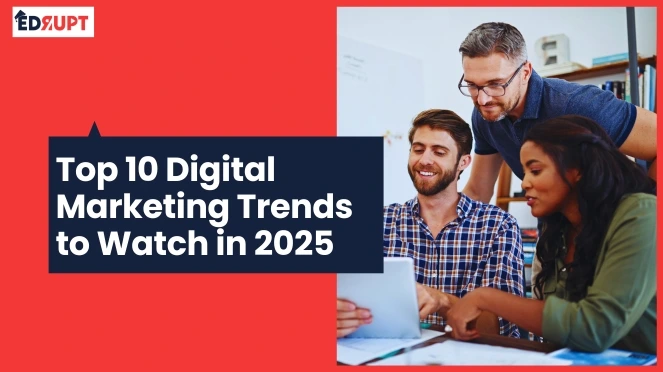Digital marketing is a constantly evolving field, with new technologies and trends emerging all the time. As we head into 2025, businesses need to stay ahead of the curve to maintain their competitive edge. In this article, we’ll explore the top 10 digital marketing trends that are set to dominate the industry in 2025. From AI advancements to the increasing importance of user experience, these trends are essential for any marketer looking to stay relevant in the ever-changing digital landscape. 1. The Rise of AI and Automation in Marketing AI-Powered Marketing Tools Artificial intelligence (AI) is set to transform digital marketing even further in 2025. With the help of machine learning, marketers can now automate tasks, personalize content, and predict customer behavior more effectively. Tools powered by AI can analyze vast amounts of data, giving marketers the ability to make data-driven decisions faster than ever before. Automation of Routine Tasks Marketing automation tools are expected to become even more sophisticated. Tasks like email marketing, lead scoring, customer segmentation, and even content generation will increasingly be handled by AI-driven automation systems, freeing up marketers to focus on strategy and creativity. 2. Voice Search Optimization Increasing Popularity of Voice Assistants Voice search is rapidly gaining popularity, thanks to the widespread use of voice assistants like Alexa, Siri, and Google Assistant. In 2025, optimizing for voice search will become a must for businesses looking to reach their target audience. Marketers will need to focus on long-tail keywords, natural language processing (NLP), and ensuring their content is mobile-friendly to cater to voice search queries. Conversational Marketing and Chatbots Voice search will also boost the use of chatbots for customer service. Chatbots will leverage NLP to understand and respond to consumer queries more effectively, creating smoother, more interactive experiences. 3. Personalization at Scale Hyper-Personalized Content Consumers expect a personalized experience, and in 2025, brands will go even further by offering hyper-personalized content. With the help of AI and data analytics, marketers can deliver tailored messages, recommendations, and offers based on individual preferences, behaviors, and interactions. Predictive Analytics for Personalization By analyzing past consumer behavior, predictive analytics tools will allow marketers to anticipate what their customers want next, enabling them to create personalized experiences at scale. 4. Video Marketing and Interactive Content Short-Form Video Dominance Video marketing has been on the rise for years, and in 2025, short-form videos (think TikTok, Instagram Reels, and YouTube Shorts) will dominate the digital marketing landscape. These bite-sized videos are perfect for capturing the attention of the modern, fast-paced consumer. Interactive Video Content In addition to short-form videos, interactive video content will gain traction. Think of videos that allow viewers to make choices, engage with clickable links, or even participate in live events. Interactive videos create a more immersive and engaging experience, which leads to higher levels of consumer engagement. 5. The Growth of Augmented Reality (AR) and Virtual Reality (VR) Immersive Shopping Experiences In 2025, augmented reality and virtual reality will play a significant role in reshaping online shopping. With AR, consumers can virtually try on products, such as clothing or makeup, before making a purchase. VR, on the other hand, will offer more immersive shopping experiences, allowing customers to explore virtual stores and products more interactively. Enhanced Brand Storytelling AR and VR will also transform brand storytelling. Brands can create fully immersive experiences that engage customers in innovative ways, whether through virtual tours, interactive product demos, or storytelling through AR features on mobile apps. 6. The Increasing Importance of User Experience (UX) Mobile-First and Responsive Design With mobile usage surpassing desktop, optimizing your website and digital content for mobile devices will be critical in 2025. Mobile-first design, responsive websites, and fast-loading pages will be essential components of a seamless user experience (UX). Improved Website Navigation and Accessibility In addition to mobile optimization, UX will be enhanced by intuitive website navigation and better accessibility for all users, including those with disabilities. A user-friendly, accessible website will not only improve your customer satisfaction but also help your SEO ranking. 7. Sustainability and Ethical Marketing Consumers Demanding Green Practices As environmental concerns continue to rise, sustainability will be a key focus for digital marketers in 2025. Brands will need to communicate their environmental impact, including eco-friendly product offerings, ethical sourcing, and sustainable practices, to appeal to eco-conscious consumers. Transparency and Corporate Social Responsibility (CSR) Transparency in marketing and ethical practices will also be in the spotlight. Marketers will need to emphasize their commitment to CSR initiatives, including diversity, equity, and inclusion, and be transparent about their supply chains and sourcing. 8. Influencer Marketing Evolution Micro-Influencers and Niche Audiences Influencer marketing isn’t going away—in fact, it’s evolving. In 2025, micro-influencers with niche audiences will become even more valuable to brands. These influencers have a higher level of trust and engagement with their followers, which leads to more authentic and targeted marketing campaigns. Long-Term Brand Partnerships Marketers will also shift toward building long-term relationships with influencers rather than short-term one-off collaborations. This will help create more authentic and sustainable brand advocacy. 9. Social Commerce: Shopping Directly from Social Media Seamless Shopping on Social Platforms Social commerce is rapidly gaining momentum, with platforms like Instagram, Facebook, and TikTok already offering shopping features. By 2025, consumers will expect to shop directly from social media platforms without ever leaving the app. Social commerce will become a key focus for brands looking to drive sales and create a seamless shopping experience. Shoppable Videos and Live Streaming Live streaming will play an even bigger role in social commerce in 2025. Expect to see more brands hosting live-streamed shopping events where consumers can ask questions, watch product demonstrations, and make instant purchases. 10. Blockchain and Privacy-First Marketing Enhanced Data Security As data privacy concerns continue to rise, marketers will need to prioritize security and transparency. Blockchain technology could revolutionize the way data is stored and shared, allowing consumers more control over their personal information and ensuring greater security in transactions. Privacy-Centric Marketing Campaigns With stricter data privacy regulations
The digital marketing world is abuzz with Google’s latest manual action against Forbes Advisor, citing violations under its Site Reputation Abuse Policy. This isn’t the first time Google has cracked the whip on Forbes, raising eyebrows and prompting curiosity about the reasons behind these recurring penalties. In this blog, we’ll dissect what happened this time, compare it to past penalties Forbes faced, and explore Google’s Site Reputation Abuse Policy in depth. Plus, we’ll highlight key takeaways for digital marketers—especially for those looking to thrive in the ever-evolving SEO landscape. A Brief History of Google’s Actions Against Forbes Forbes’ Past Penalties Forbes first faced Google’s ire in 2011, when the site was penalised for violating link-building practices. This penalty followed the discovery of a paid link scheme that manipulated search rankings. Back then, such practices were rampant but became one of the major catalysts for Google’s crackdown on link spam. The penalty dealt a blow to Forbes’ visibility in search results, sending shockwaves through the publishing and digital marketing industry. It served as a wake-up call for businesses relying on manipulative tactics to game Google’s algorithms. The Current Penalty: Site Reputation Abuse Fast forward to 2024, and Forbes Advisor finds itself in the spotlight again—this time for breaching Google’s Site Reputation Abuse Policy. Unlike the previous link-building scandal, this penalty focuses on a newer set of guidelines that aim to preserve content credibility and user trust. The Site Reputation Abuse Policy, introduced in early 2023, targets websites that engage in practices such as: Misrepresenting their expertise or authority. Manipulating site reputation signals. Publishing misleading or deceptive content to enhance rankings. Forbes Advisor’s latest penalty highlights Google’s evolving focus on maintaining high-quality, trustworthy content across the web. Comparing Past and Present Penalties Aspect 2011 Penalty 2024 Penalty Reason Paid link schemes Site reputation abuse Impact Lowered search visibility Reputation damage + visibility Google’s Focus Link integrity Content trustworthiness Industry Takeaway Avoid link manipulations Uphold content credibility What is Google’s Site Reputation Abuse Policy? Google’s Site Reputation Abuse Policy emphasises transparency, credibility, and trustworthiness in web content. Here’s what the policy entails and how to avoid penalties: Key Focus Areas of the Policy Misrepresentation of Expertise: Websites falsely claiming credentials or expertise to gain user trust. Manipulation of Reputation Signals: Activities like creating fake reviews or backlinks to enhance perceived authority. Deceptive Content Practices: Publishing misleading content for monetary or traffic gains. Why This Policy Matters in SEO Google aims to ensure that users access authentic, high-quality information. By enforcing this policy, it maintains the integrity of its search results, ensuring users trust the information they find online. How to Stay Compliant Publish transparent and accurate content. Avoid manipulative tactics, such as fake reviews or exaggerated claims. Focus on organic growth through valuable content rather than shortcuts. The Penalty That Shook the Market: Industry Experts Share Their Take The digital marketing sphere is abuzz following Google’s recent manual action against Forbes Advisor. The penalty, issued under Google’s Site Reputation Abuse Policy, has reignited conversations around the evolving landscape of search engine optimization (SEO) and the importance of maintaining content integrity. This blog dives into what experts are saying about the penalty, its broader implications for digital marketers, and actionable insights to future-proof your online strategy. Google issued a manual penalty to Forbes Advisor, citing violations of its Site Reputation Abuse Policy. This policy, introduced in 2023, targets websites that engage in deceptive practices to manipulate their online reputation. Forbes Advisor’s case reflects Google’s commitment to ensuring that its search results remain a trustworthy resource for users. The penalty resulted in a significant visibility hit for the website, impacting both organic traffic and public perception. For a platform as influential as Forbes Advisor, this action serves as a strong signal to marketers everywhere. Industry Reactions: What Experts Are Saying 1. An Emphasis on Trustworthiness “Google is doubling down on content trustworthiness. If you’re publishing for clicks and rankings without prioritizing user value, you’re walking a tightrope,” says Mark Thompson, an SEO strategist. Experts agree that the penalty highlights Google’s priority on ensuring accurate, credible content. Websites can no longer rely on outdated shortcuts or manipulative practices to gain an edge. 2. A Wake-Up Call for Publishers Lisa Morgan, a content marketing consultant, notes: “This penalty isn’t just about Forbes Advisor. It’s a warning to all publishers. Your content and reputation are now under more scrutiny than ever.” For marketers, this underscores the need to build authority organically and avoid any semblance of manipulation. 3. A Shift in Google’s Enforcement Approach “Google’s Site Reputation Abuse Policy is not just another guideline—it’s a shift in enforcement,” explains Rajiv Mehta, a digital marketing lecturer. “The algorithm is smarter, but so are manual reviewers. Publishers can’t afford to cut corners anymore.” Key Takeaways for Digital Marketers – What To Learn Transparency is Non-Negotiable Avoid exaggerating your expertise or publishing misleading content. Build trust through honest, accurate, and valuable information. Reputation is Built, Not Bought Artificially inflating your reputation through fake reviews or backlinks is a risk. Invest in organic reputation-building strategies. Quality Over Quantity Publishing fewer, higher-quality pieces of content is more effective than churning out low-value articles. Monitor Google’s Policies Stay informed about updates like the Site Reputation Abuse Policy. Adapt your strategies to remain compliant. Broader Implications for the Market A New Era for SEO The Forbes Advisor penalty signals a turning point in Google’s relationship with content creators and publishers. While technical SEO remains important, the focus has shifted to content credibility and authority. This raises the bar for all players in the market. The Role of AI in Policy Enforcement With advances in machine learning, Google can better detect manipulative tactics. Combine that with manual reviews, and the scope for cutting corners has significantly narrowed. The Importance of Education The penalty also emphasizes the need for ongoing education in digital marketing. Businesses and marketers who invest in ethical SEO practices will not only avoid penalties but also gain a competitive edge. Final Thoughts


